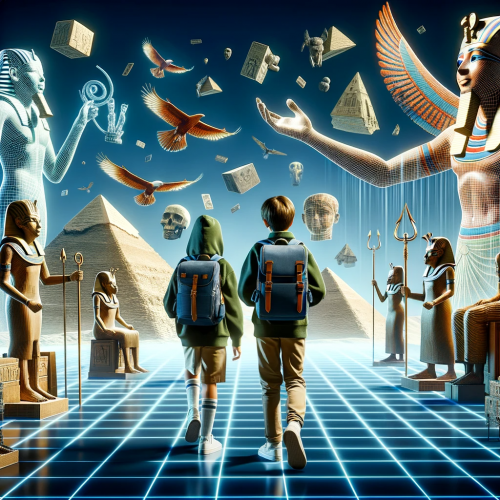Level 3 Blog – Reflect on Analog Design Process — 80 Days in Predynastic Egypt

( Created by ChatGPT + DALL.E3 Plugin. Prompt: Artistic rendering of two school students dressed in current-day clothes and carrying backpacks, as they venture into a digital representation of old Egypt. Floating projections of landmarks like pyramids and the Temple of Dendur, the gods Osiris, Anubis, Horus, mummies, and a statue of Khafre engross them. )
Level 3 Blog – Reflect on Analog Design Process– 80 Days in Predynastic Egypt
I am on my way to re-envision my mentor games into a board game. Here is this Blog Entry, I am going to document my work and reflect on how this process has gone.
My process for designing the mechanics for my mentor games. What worked best, what didn’t?
During the iterative prototyping process, I initially wanted to use some mechanics, but eventually which were changed with the game’s core dynamic adjustment. Currently, I am using Exploration as my new game’s core dynamic. So, here are the main mechanics I want to keep in the re-envisioned game.
- The dice brings random effects to the game (Uncertainty mechanics)
- The shuffled “Reward” cards bring random questions related to the celebratory affairs in ancient Egypt history (Uncertainty mechanics)
- The shuffled “Penalty” cards will give the players random questions related to the tragic affairs in ancient Egypt history (Uncertainty mechanics)
- The game board is designed in chronological order, the players will explore and review the history of egypt chronologically (Progression mechanics)
If I had to do this process over again, I may change some elements based on different targeted audiences. A good design needs to be accepted by the players. Without the user’s review and feedback, the designer will find it hard to spotlight the weak points of the design.
My re-envisioned idea
- Mentor Game 1 Predynastic Egypt
- Subject area: History
- Learning domain: Ancient Egypt History
- Learning goal/objective: Familiarize students with the development of civilizations, culture, and religion systems in ancient Egypt.
- Game goal: Build a successful and strong civilization in Predynastic Egypt.
- Core dynamic: Territory acquisition
- Main mechanics: resources collect (resource management mechanics); turning setting (control mechanics); random affairs (uncertainty mechanics); real historical affairs (progression mechanics)
- Mentor Game 2 80 Days
- Subject area: Geology & History
- Learning domain: Critical Thinking: Players must make strategic decisions to manage their resources, choose the best routes, and handle unexpected challenges. Problem-Solving: As they encounter various situations and dilemmas, players need to find creative solutions to continue their journey successfully.
- Learning goal/objective: “80 Days” encourages strategic thinking and resource management as players plan their routes, budget their finances, and choose their travel options.
- Game goal: Players try to circumnavigate the globe in 80 days or less.
- Core dynamic: Race to the finish.
- Main mechanics: budget plan (resource management mechanics); route selection (control mechanics); random affairs (uncertainty mechanics); dialogues (progression mechanics)
- Re-envisioned Game Details:
- New game title: 80 Days in Predynastic Egypt
- Subject area: History & Geography
- Learning domain, learning goal/objective: The architectures, religious system, and civilization development in Ancient Egypt
- After playing the board game 80 Days in Predynastic Egypt, the players will be able:
Learning objective 1: To memorize the different types of architectures, and the development of religious system and civilization in Ancient Egypt
Learning objective 2: To use the knowledge learnt from the Culture Foundation course to resolve the problems in the game.
Learning objective 3: To compare one’s own report with others’ reports and try to make improvement.
Learning objective 4: To create a group-made Predynastic Egypt journey report for all players.
- Game goal:To resolve the problems related to Egyptian civilization in 80 turns and create a team story to introduce Predynastic Egypt based on the questions and learning from the culture foundation course.
- Core dynamic: Exploration. I changed the core dynamic from Territory acquisition to exploration.
- Mechanics: Uncertainty mechanics: the dice brings random effects to the game; the shuffled real history cards bring random questions related to ancient Egypt history; the shuffled affair cards will give the player bonus points or penalties. Progression mechanics: the game board is designed in chronological order, the players will explore the history of egypt chronologically.
- Describe your idea briefly including the following:
This board game is similar to Monopoly (Links to an external site.) but it follows a single direction along the chronological development of Ancient Egypt in each round. The target audience is students in grades 4 to 8 who have recently learned about Predynastic Egypt, and can use this board game for review. In my game, 80 days in Predynastic Egypt, the “Chance” and “Community Chest” cards from the original Monopoly will be replaced with “Reward” and “Penalty” cards.
Before the game begins, the student players will form groups, each consisting of 3 to 4 students. During the game, each group of students will represent a group of tourists, and they will roll the dice to determine their pace in the virtual journey through Predynastic Egypt. The game board features illustrations on the grids that depict challenges, bonuses, or penalties, all of which are related to the real history, civilization, and religion systems of ancient Egypt. Some grids will lead the players to check the “Reward” or “Penalty” cards to add more story details, random and fun. In a turn, the player will roll the dice, then move the Player chess to the relative grid according to the number on the dice, then the player will check the information on the grid. Different grids contain different information, like: penalty, reward, common step, which will lead the player to check relative cards or information to compose a journey story (Core loop). Each round of the game will be finished in 80 turns. Then, all the players will collaborate to solve problems and use their game experience to create a presentation that introduces their virtual journey, helping them learn and review knowledge about predynastic Egypt.
Peer responses
Peer reviewer A:
Pose at least one question:
How will the territory acquisition work with the card-based system?
How will you incorporate culture and lifestyle (your 1st learning objective) into the mechanics?
- One idea for improvement for the design idea
I’m not sure if you’ve played a deck building type game, but those are card-based games where you can “buy” other cards using some sort of resource. This could be an idea as far as territory acquisition.
As far as the score recording aspect, I think you could come up with some sort of “point” system (like, maybe different territories are worth different points?) like Catan uses. This would be a simple and clear way for players to record score.
- Does the proposed game address at least one of the three Cs of social mechanics (cooperation, collaboration, & competition)?
I feel like competition aspects are implied here but not explicitly stated. I assume this since each player will be recording their score as they play. The game goal could be a little more specific by being specific what a “great” civilization is mechanics-wise
Peer reviewer B:
I had never heard of the game ‘Magic: The Gathering’ before and had to look it up to have a better reference point. I understand that it is a card game, but you also reference a board game in your reimagined design. Will this be a board game with a card aspect or simply using cards? Honestly, I feel that the goal of developing a civilization may be too big to translate into a card game and would definitely suggest you consider a combination.
I agree with Kristin that there seems to be a sense of competition implied in the design with the mention of recording scores. Maybe adding another layer of competition by including a race to the finish aspect where players are working to be the first to accomplish a particular goal.
My Reflection on the peer reviews:
I was so lucky to have two peer reviews which pointed out very critical problems in my game. Based on the comments and suggestions, I made the following improvements:
- Changed the game style.
- Changed the game core dynamic
- Added more learning objectives.
- Changed the game rules.
- Improved and added the game mechanics.
